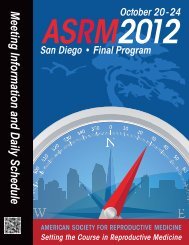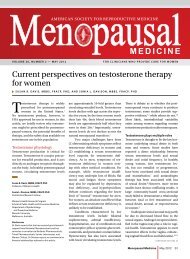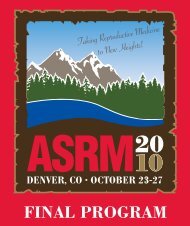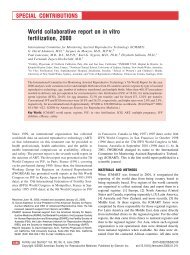scientific program • symposia - American Society for Reproductive ...
scientific program • symposia - American Society for Reproductive ...
scientific program • symposia - American Society for Reproductive ...
Create successful ePaper yourself
Turn your PDF publications into a flip-book with our unique Google optimized e-Paper software.
SCIENTIFIC PROGRAM <strong>•</strong> PLENARY SESSIONS<br />
Tuesday, October 18, 2011 9:00 am – 10:30 am<br />
Plenary Session 3<br />
9:00 am<br />
PROSPECTS FOR STEM CELL-BASED MEDICINE<br />
Endowed by a 1992 grant from EMD Serono, Inc.<br />
David T. Scadden, M.D.<br />
Harvard University<br />
Introducer: Linda C. Giudice, M.D., Ph.D.<br />
Needs Assessment and Description<br />
Stem cell biology is a rapidly changing area of basic<br />
science that has much promise <strong>for</strong> medical care. Yet,<br />
clinical applications remain very limited. An update on the<br />
state of the field and directions of current research is the<br />
substance of this presentation.<br />
Learning Objectives<br />
At the conclusion of this session, participants should be able<br />
to:<br />
1. Define two approaches beyond that of cell replacement<br />
where stem cell biology may result in stem cell-based<br />
medicine.<br />
9:45 am<br />
SOCIETY FOR THE STUDY OF REPRODUCTION EXCHANGE<br />
SPEAKER<br />
IN VIVO ANALYSIS OF PROGESTERONE RECEPTOR SIGNALING<br />
IN THE ENDOMETRIUM<br />
Francesco J. DeMayo, Ph.D.<br />
Baylor College of Medicine<br />
Introducer: Dolores J. Lamb, Ph.D., H.C.L.D.<br />
Needs Assessment and Description<br />
This session will detail the role of the progesterone receptor<br />
in the regulation of endometrial function. This will be done<br />
by demonstrating how mouse models can be used to<br />
dissect the signaling pathways in the uterus and define the<br />
interaction of the cellular compartments in the regulation of<br />
uterine function during pregnancy and in diseased states.<br />
Chapin Theatre<br />
Moderator: William E. Gibbons, M.D.<br />
59<br />
ACGME COMPETENCY<br />
Medical Knowledge<br />
TEST QUESTION:<br />
How might the ability to ”re<strong>program</strong>” the fate of cells result<br />
in new drug-based and cell-based therapies?<br />
A. By enabling the correction of genetic defects emerging<br />
in cancer cells.<br />
B. By creating cell “decoys” in autoimmune disease.<br />
C. By generating cells affected by disease to serve as<br />
targets in drug screening or as replacement cells.<br />
Learning Objectives<br />
At the conclusion of this session, participants should be able<br />
to:<br />
1. Summarize the role of the progesterone receptor in the<br />
regulation of endometrial development, the preparation<br />
of the endometrium <strong>for</strong> embryo attachment and support<br />
of embryo during pregnancy.<br />
2. Outline signaling pathways regulated by progesterone<br />
signaling.<br />
ACGME COMPETENCY<br />
Medical Knowledge<br />
TEST QUESTION:<br />
The progesterone receptor<br />
A. Has consistent expression in the cellular compartments<br />
of the endometrium of the endometrium in all states of<br />
the cycle.<br />
B. Regulates growth factor signaling in the uterus in<br />
preparation <strong>for</strong> embryo implantation.<br />
C.Promotes estrogen-induced proliferation in the uterine<br />
epithelium.








